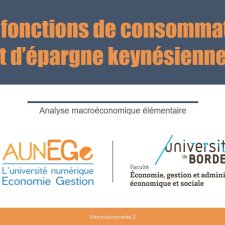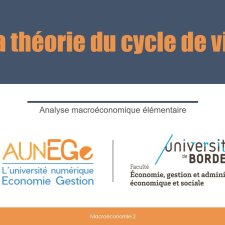Notice
Competition and Cooperation
- document 1 document 2 document 3
- niveau 1 niveau 2 niveau 3
Descriptif
Numerous applications of economics are based on models that assume individual economic actors take prices as given. Indeed, this assumption underlies many empirical studies. The question of whether such an assumption can be justified as arising in the context of individual and group optimizing behavior has been the subject of extensive investigation.One answer to the question originates with the work of Edgeworth (1881), which argues that groups individuals cannot improve upon their part of a price-taking economic equilibrium by cooperation, that is, the set of outcomes that are stable against collective activities of groups – the core-- is equivalent to the set of price-taking equilibrium outcomes. This line of research, continued in the celebrated works of Debreu and Scarf (1963) and Aumann (1964) and in much subsequent research, treats private goods economies without externalities. Externalities, however, are common; people consume and produce in groups; individuals are affected by the presence and activities of others; individuals may enjoy being with others or they may suffer from congestion. This presentation reviews research demonstrating that for a broad class of economies, including economies with shared goods, with indivisibilities and/or non-monotonicities, with coalition production, if there are many participants in an economy then the equivalence of the core and the set of equilibrium outcomes holds.
The presentation will conclude with some discussion of the latest results but some of the main papers reporting earlier results are listed below:
Intervention / Responsable scientifique
Thème
Documentation
Liens
Colloquium Jacques Morgenstern
Le but du colloquium est d’offrir une vision d’ensemble des recherches les plus actives et les plus prometteuses dans le domaine des Sciences et Technologies de l’Information et de la Communication (STIC). Nouveaux thèmes scientifiques
Sur le même thème
-
Tokyo, plus grande « ville » au monde : aménager et gouverner la démesure
Languillon-AusselRaphaëlAvec ses quelques trente-cinq millions d’habitants, Tokyo est la « ville » la plus peuplée au monde, et l’une des métropoles les plus riches. Cette présentation vise à décrire, analyser et expliquer,
-
Les fonctions de consommation et d’épargne keynésiennes
Maveyraud-TricoireSamuelLes fonctions de consommation et d’épargne keynésiennes
-
La détermination du PIB à court terme
Maveyraud-TricoireSamuelLa détermination du PIB à court terme
-
Demande en biens et services et fluctuations conjoncturelles
Maveyraud-TricoireSamuelDemande en biens et services et fluctuations conjoncturelles
-
-
-
Les propensions à consommer et à épargner
Maveyraud-TricoireSamuelLes propensions à consommer et à épargner
-
Le marché des biens et services à court terme
Maveyraud-TricoireSamuelLe marché des biens et services à court terme
-
Les fluctuations conjoncturelles de l’activité
Maveyraud-TricoireSamuelLes fluctuations conjoncturelles de l’activité
-
Les fluctuations du revenu courant et le lissage de la consommation
Maveyraud-TricoireSamuelLes fluctuations du revenu courant et le lissage de la consommation
-
L'origine des fluctuations de la demande
Maveyraud-TricoireSamuelL'origine des fluctuations de la demande
-
L'approche par la dépense du PIB et les grandes fonctions macroéconomiques
Maveyraud-TricoireSamuelL'approche par la dépense du PIB et les grandes fonctions macroéconomiques














